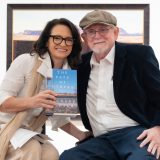
How to Use Informational Interviews to Land your Dream Job Career Corner
May 26, 2022

Erin Berthon, MA Career Manager, Wilkinson College of Arts, Humanities, and Social Sciences, at Chapman University
The Wilkinson College of Arts, Humanities, and Social Sciences graduating class of 2022 is currently entering a world where it might seem hard to get the job they want and deserve. Some may say that expecting to walk immediately into the right job is just setting yourself up for defeat. There is some truth to this, but a more accurate statement would be, it’s hard to get your dream job these days if you rely on conventional methods.
Applying for jobs by only submitting your resume through Linkedin or other job platforms, puts you at a real disadvantage. Consider adding informational interviews to your job search process. An information interview is an informal conversation you can have with someone working in an area of interest. It is an effective tool and is best done after preliminary online research. Most importantly, this is not a job interview, and the objective is not to ask for a job – it is to gain information about an industry or organization.
I have had many students try this method, and when they felt awkward reaching out to people they don’t know, I always suggest reaching out to alumni on Linkedln. They have found that alumni like to help out other Chapman students. People actually enjoy talking about themselves and sharing a reflection on their professional life, giving advice, and talking to someone interested in their field.
Benefits of Informational Interviewing
- Initiate a professional relationship and expand your network of contacts in a specific career field; meeting people can lead to mentorship or a job for your future.
- Get tips and insider knowledge about preparing to get that first job. Maybe they are willing to look over your resume or a cover letter for feedback.
- Find out about career paths that you didn’t even know existed- there are SO many!
- Get firsthand details about the career field; knowing the reality of a job may help guide you in the correct direction.
- Making that personal connection with someone makes you stand out. Though you do not ask for a job, they may pass along your resume.
So how do you start this? My advice is to start on Linkedin or with a company/organization that interests you. Begin by targeting people you have direct access to; this could be family, friends, or alumni. Send an email or direct message that is short. Of course, you won’t’ hear back from everyone, but don’t let that discourage you. Eventually, you will hear something. Once you get that appointment, it is time to get prepared.
Steps for the Informational Interview
- Dress appropriately, as you would for a job interview.
- If meeting in person, arrive on time or a few minutes early.
- Bring your list of questions and take notes if you like.
- Restate that your objective is to get information and advice, not a job.
- Give a brief overview of yourself and your education and/or work background.
- Be prepared to direct the interview and let the conversation flow naturally, and encourage the interviewee to do most of the talking.
- Respect the person’s time. Limit the meeting to the agreed-upon time frame.
- Ask the person if you may contact them again in the future with other questions.
- Ask for names of other people to meet so as to gain different perspectives.
- Always send them a thank you the next day!
Reading through all this may make you feel a bit overwhelmed, but I promise, it works! Your network is your net worth.
Informational interviews are a great way to go above and beyond customary job searching procedures. When you follow these best practices for planning, conducting, and following up after an informational interview, you can gain valuable insight and information that can help you plot out a career path that’s suitable for your skills, experience, and interests. Good Luck!

